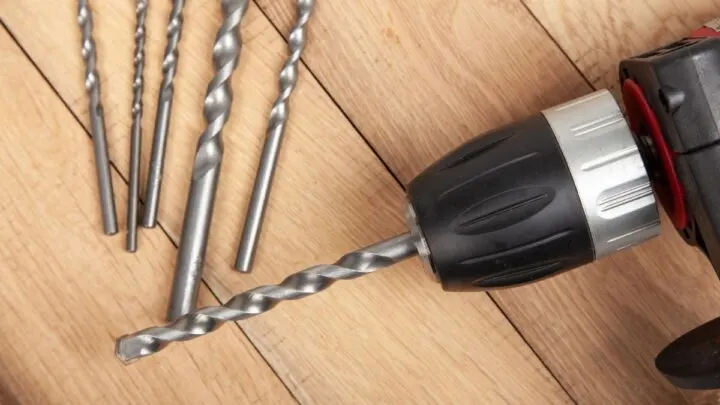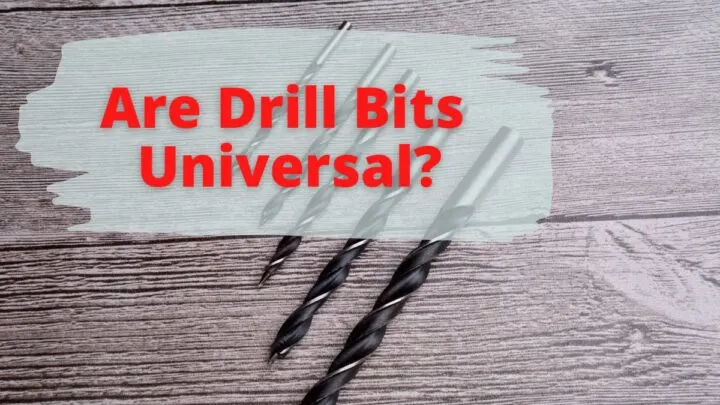Whether you are an industry pro or simply taking care of some work at home, having a power drill is a must, but are all drill bits universal?
Power drills can be used to perform a wide variety of tasks such as construction work, fixing furniture, putting up shelves, or even just hanging a painting, making them dynamic tools for so many different purposes.
However, you want to ensure that you are using the correct drill bit for the task at hand.
Drill bits are not universal because they can greatly vary in size, with the chuck diameter of a drill determining the maximum size that will fit the tool.
In addition, drill bits will vary based on their drill classification – with SDS and Impact Drivers being incompatible with standard powers drills.
These days, having a power drill at home is about as common as owning a screwdriver, as more and more people rely on themselves to take care of basic repairs at home instead of always calling out a professional for assistance.
These tools make life a whole lot easier and you can take some pride in your work knowing that you were able to get the job done on your own.
However, when you grab your power drill, you want to ensure that it is equipped with the right drill bit for what you want to do!
Drill bits were designed for specific purposes and you will also find that there is more than one type of power drill, which means that you need to use your tools appropriately if you want them to function properly.
To help you understand this further, we are going to take a closer look at drill bits in more detail.

Types of Drill Bits
If you are new to power tools, it is very easy to assume that a single drill will be able to support every kind of drill bit.
Unfortunately, drill bits are not universal, which is why you want to choose the right one for the task at hand.
Selecting the right drill bit for the work that you need to get done can make all of the difference in finishing the job.
A failure to do so will not only result in a lack of compatibility with your tools, but it could also potentially damage your drill bit.
In order to understand how to use the right drill bits, we need to break down the different types that exist.
Power drills are pretty dynamic and there are a lot of factors to consider when choosing the right bit, but once you get your head around their functions and features, the rest will come naturally.
Drill Bits by Size
The most fundamental characteristic of any drill bit is its size.
Before you begin your work, always understand exactly what you are trying to achieve beforehand so that you can select your tools and their components appropriately.
There is an assortment of sizes for drill bits and you want to choose the right one for each job.
This is not only important to complete your task but also to ensure that your bit is going to fit your drill.
You can adjust most power drills on the market to fit a variety of different sizes but each one is going to have its limitations.
The key thing to take from this is that each drill can take a bit up to its maximum chuck diameter.
This means that if you are working with a drill that has a chuck diameter of ⅜ of an inch, the largest drill bit that the tool can take is ⅜ of an inch.
The chuck capacity will vary for each drill that you look at but you will find that the same principle applies across the board.
The most common diameters for chuck size on the market are:
- ¼ inch
- ½ inch
- ⅜ inch
If you have a power drill and want to confirm its maximum drill bit size, the best way to do this is to check your tool’s manual.
Alternatively, you can always test the chuck size of the drill by sticking bits inside to see if they fit, with the maximum size that it takes indicating its capacity.
Drill Classifications
Most people that have a basic understanding of power tools are familiar with standard power drills which use normal drill bits.
However, this is not the only kind of drill that exists, as there are alternative models and classifications.
Selecting the right drill bit for the right drill classification is going to be mandatory if you want the tool to function.
Standard drill bits are not going to fit inside different types of drills, which is why bits cannot be used universally. Let’s take a look at some different drill classifications.
SDS Drill
An SDS drill is quite different than the average power drill that you have at home.
You would not use this kind of drill to hang up a family photo, as it is designed for more heavy tasks such as penetrating through concrete, which is why it is common in industries such as plumbing and construction.
Bits from a standard power drill will not fit into an SDS drill.
This heavy-duty drill needs specific types of bits that were designed just for it.
Impact Drivers
It can be very easy to mix up an impact driver with a standard power drill at first glance, as they look quite similar.
However, both of these tools were ultimately designed to perform different tasks.
Whereas a standard drill is used only to drill holes or remove screws, an impact driver is made for bolts, fasteners, and screws.
You can identify an impact driver by the shape of its drill bit. This kind of power tool uses a hex-shaped driver bit.
Both a standard drill and an impact driver can at times be used interchangeably with one another, but nonetheless, they will not be compatible when it comes to bits.
Are Drill Bits Brand Dependent?
When shopping for a drill, you will see that there are a ton of different options on the market.
A lot of reputable brands in the power tool industry are in competition with one another and they often try to convince their customers that their product is the best.
By using clever marketing, many brands have left people thinking that their bits will only work with their specific tools.
However, this is not the case by any means. It is important to understand that drill bits are differentiated by classification and by size, not by brand.
Whether it is a Black & Decker, Craftsman, or another reputable manufacturer, drill bits made by these brands will be compatible with one another.
Just as we mentioned above with selecting the right-sized bit, you want to apply the same principle when transitioning from one brand to another.
So long as the chuck diameter is in line with the alternative drill that you want to use, it should fit without any issues.
With that being said, you want to ensure that the power tool that you are using is the right one.
As we mentioned, there are a number of different power drills out there and they each have their own types of drill bits that were designed for a specific purpose.
You need to ensure that the classification of the bit matches the tool that you are using.
Although drill bits are not brand dependent, each brand will most likely have different types of drills that they make – in which case the bits will not be compatible with one another.
Summing Up If Drill Bits Are Universal
Drill bits are not universal, and you should look into what size and chuck diameter you need before buying anything. Otherwise, you could damage both your power tool and the bit itself.
Drill bits are not dependent on brand, meaning you can buy whichever brand you like best and can even mix and match. Just make sure you have the correct size!


